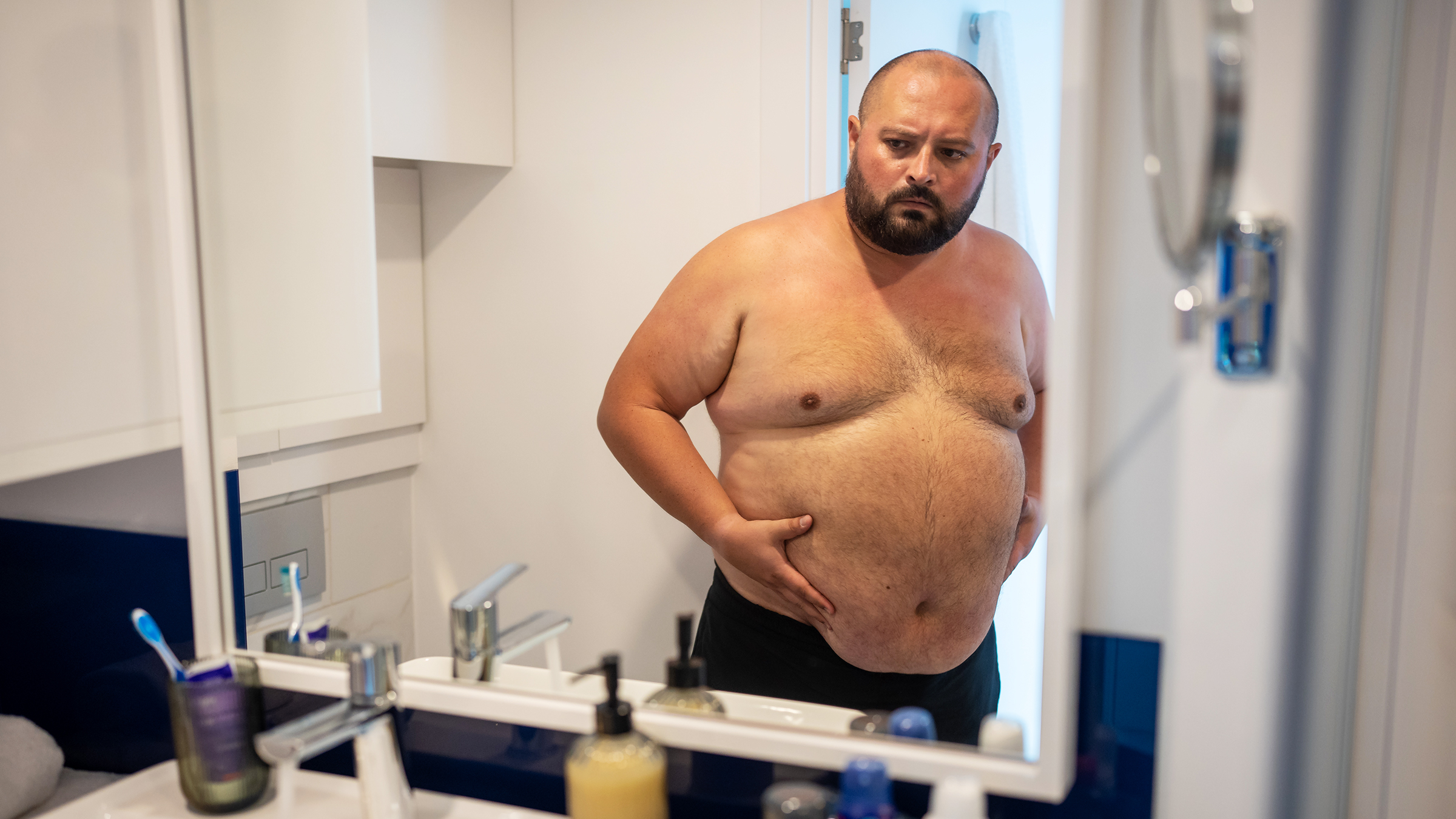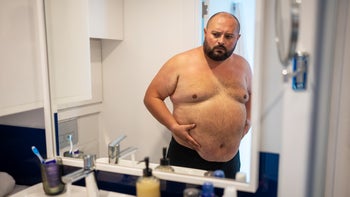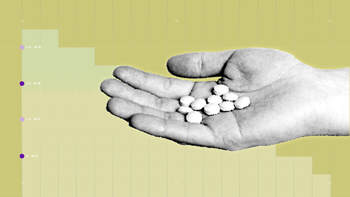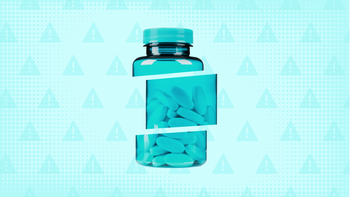
Can Men Lactate? What to Know About Male Lactation
Key takeaways:
Anyone with breast tissue, even if you aren’t pregnant or nursing can make breast milk (lactate). It’s also possible for men to lactate.
Lactating in a man can be a sign of an underlying medical condition that shouldn’t be ignored. Conditions like hormonal imbalance, tumors, or hypothyroidism can cause lactation in men.
Other causes of male lactation can include medications, supplements, or nipple stimulation. Your healthcare professional can work with you to figure out the source of your lactation.

A weekly shot to lose weight*
GLP-1s can help you reach your weight loss goals—and stay there. Tap now to see if you qualify.

*With diet and exercise. Supplies limited. See Important Safety & Black Box Warning at ro.co/safety-info/glp1.
The Unmentionables is a series that answers common questions we all have about our bodies but are sometimes afraid to ask.
Breast milk is made in the mammary glands of the breasts. Typically, lactation happens in response to pregnancy and birth-related hormonal changes. While it’s rare, sometimes people who aren’t pregnant or nursing (including men), produce milk from their nipples. When this happens, it’s usually a sign of an underlying issue.
Can you lactate without being pregnant?
It’s possible for a person to lactate without being pregnant. This can be the result of medical conditions like hormonal disorders or certain tumors.
This can also happen apart from pregnancy due to the use of:
Herbs and supplements (like nettle or fenugreek)
Hormones
Medications
Nipple stimulation
Lactation can happen when there’s excessive irritation of the chest. For example, breast stimulation, tight fitting clothes, shingles, and eczema can cause milk production. Breast implants or breast reduction surgery have been known to cause lactation, too.
Newborn babies also commonly leak milk in the first 2 months of life — commonly referred to as “witch's milk”. This can happen as a result of exposure to the mother’s hormones while in the womb. It’s more likely in babies that have large breast nodules you can see and feel, and typically goes away after a couple of months.
Can a person who is male produce breast milk?
Any person with breast tissue can lactate — even men. That’s because breast tissue is composed of thousands of glands that produce milk in response to hormones secreted from the pituitary gland.
All children have a small amount of breast tissue. If that tissue is exposed to hormones like estrogen and progesterone during puberty, it develops into a breast capable of making milk. But for males who don’t typically develop full breasts in puberty, lactation is still possible — though unusual.
Galactorrhea is the medical term for breast milk production that’s not due to pregnancy or nursing.
WHAT TO READ NEXT
Popular stories this week
What makes a man lactate?
Most cases of male galactorrhea are caused by high levels of a hormone called prolactin. Prolactin is the human hormone that stimulates milk production. Everyone has a small amount of prolactin in their blood, but it’s not usually enough to lead to milk production.
Hyperprolactinemia is the medical term for a person who has abnormally high levels of prolactin but isn’t pregnant or nursing. When prolactin levels are high, the mammary glands in the breast produce milk.
Let’s run through some common causes of hyperprolactinemia.
Pituitary tumor
A prolactinoma is a benign tumor in the pituitary gland, the part of the brain that makes prolactin. These types of tumors are the main cause of hyperprolactinemia and unwanted lactation.
Hypothyroidism
Hypothyroidism, an underactive thyroid, is another, less common cause of hyperprolactinemia. Low thyroid hormone levels can lead to extra activity in the pituitary gland. And, if the cells in the pituitary that control prolactin are overstimulated, that can cause hyperprolactinemia.
Medication side effects
Some medications can lead to hyperprolactinemia and abnormal breast development in men, which is called gynecomastia.
Some common medications that can have this effect include:
Certain antipsychotics like haloperidol (Haldol), risperidone (Risperdal)
Nausea medication like metoclopramide (Reglan)
Antidepressant medications like fluoxetine (Prozac) and sertraline (Zoloft)
Blood pressure medication like verapamil
Is it bad if a man has high levels of prolactin?
High prolactin levels in a man can cause a range of symptoms and issues related to sex and physical appearance. These include:
Galactorrhea (abnormal lactation)
Gynecomastia (abnormal breast tissue growth)
Infertility and low sperm counts
Is lactation in a man serious?
Though most causes of lactation are not life-threatening, don’t ignore the problem. A good first step for men who are lactating is to see a healthcare professional. They’ll ask you about any other symptoms you have and any medications and supplements in your daily routine.
They’ll also likely order blood tests to see if you have abnormal levels of prolactin or other hormones, including your thyroid hormones.
It’s possible you may need imaging tests like:
CT scan or an MRI
Mammogram
Chest ultrasound
Very rarely, lactation might be a sign of breast cancer. It’s important to see your primary care provider right away if you notice any of these worrying symptoms:
Lactation from one breast only
Skin changes around the nipple or breast
A hard or firm mass that you can feel in the breast
Blood coming from the nipple
What is the treatment for men who are lactating?
The treatment for male lactation depends on the root cause of the problem. If one of your medications is causing your hyperprolactinemia, your healthcare professional may recommend an alternative.
If hypothyroidism is the source of the problem, the next step is to figure out what’s causing the thyroid issue. Once the thyroid is treated, your prolactin levels should go back to normal, stopping the lactation.
If your hyperprolactinemia is caused by a benign brain tumor, medications may help. Prescription medications like cabergoline and bromocriptine (Parlodel) can improve your hormonal balance. When taking these medications, your prolactin levels will be checked regularly to make sure they’re going in the right direction.
The bottom line
It’s not normal for men to produce milk from their nipples. When it happens, it’s usually a result of some sort of hormonal imbalance or the side effect of a medication. Unexpected lactation may be something you’re tempted to keep quiet about, but it always needs to be checked out. Sometimes, it may be a sign of a serious problem, so the sooner the issue is diagnosed, the better.
The Unmentionables is a series that focuses on common curiosities about our bodies that, at some point, have been labeled as taboo, shameful, or embarrassing. But these are important questions we all have about our health, and we should be able to ask them. This series aims to dispel the stigma, normalize the discussion, and openly address these important health topics.
Don’t be shy. Someone else has the same question, so ask away!
References
La Torre, D., et al. (2007). Pharmacological causes of hyperprolactinemia. Therapeutics and Clinical Risk Management.
Madlon-Kay, D. J. (1986). 'Witch's Milk': Galactorrhea in the newborn. American Journal of Diseases of Children.
Mohd Hassan, S., et al. (2021). Experiences of women who underwent induced lactation: A literature review. Malaysian Family Physician.
National Institute of Diabetes and Digestive and Kidney Diseases. (2019). Prolactinoma.
Peña, K. S., et al. (2001). Evaluation and treatment of galactorrhea. American Family Physician.
ReproductiveFacts.org. (2014). Hyperprolactinemia (high prolactin levels). American Society for Reproductive Medicine.
Singh, P., et al. (2011). Hyperprolactinemia: An often missed cause of male infertility. Journal of Human Reproductive Sciences.





























